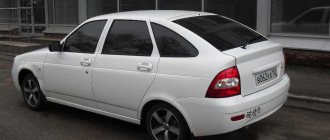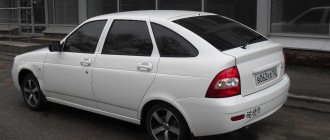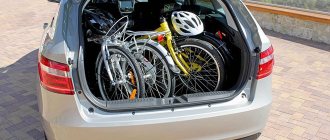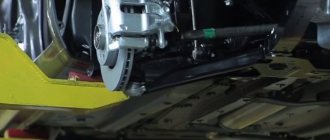What influenced the dimensions of the Lada Vesta SV Cross?
I would also like to note that in the production of AvtoVAZ’s new product, they used a completely new platform. Due to the increase in overall dimensions of the Lada Vesta SV Cross, the interior has also become noticeably larger. Vesta Cross does not have the problem of accommodating rear passengers, as was the case in the tenth family of VAZ and Lada Samara. Now you can comfortably seat passengers of any size in the back without resting your knees on the front seats.
Salon
The SW did not receive any major differences from the sedan in terms of interior decoration, but still acquired several pleasant features:
- the space above the heads of rear passengers has increased by 2.5 cm;
- an armrest with cup holders was added to the rear seat;
- A separate button is now used to heat the windshield.
Less significant additions to the interior of the new Vesta are an updated soundtrack for the turn signals and additional color inserts on the door handles and dashboard.
This is interesting: TOP best trucks: what do truckers drive?
Ground clearance
The main and biggest plus of the Russian cross-sedan is its high ground clearance. According to factory specifications, its height is 203 mm. Not every modern crossover can boast the same. High ground clearance is needed if you at least sometimes drive off smooth asphalt. However, it is also useful in big cities with their eternal construction sites, speed bumps and curbs that do not comply with GOST. Now remember how they like to raise the suspension, including on sedans, in the provinces. So, Vesta Cross is definitely in trend.
Dimensions and capacity of the trunk
Another important difference between the Vesta SW Cross and the sedan is the dimensions and functionality of the trunk. It was equipped with special fastenings and drawers for storing various small items. There are also two removable trays located under a cover in the floor, their size allows you to keep many useful tools and snow brushes there. It is under these containers that the spare wheel with a stamped disk is located.
If you fold the rear seat backs, you can increase the volume of the luggage compartment to 825 liters, while in the standard position the volume from the raised floor to the curtain is 385 liters. The maximum length that can be achieved if you need to transport something long and at the same time close the trunk door is 1820 mm to the back of the front seat, moved forward.
Disadvantages of the trunk
And even despite the fact that Vesta SV is the leader in its class in terms of length, several main disadvantages of the luggage compartment can be identified:
- High threshold, making it difficult to load and unload heavy objects. In addition to inconvenience, such a protrusion most often becomes deformed, taking on the blows of oversized loads.
- Insufficient rear door seal. This problem does not occur in everyone and not always, but it still occurs. It appears during intensive washing; water gets into the luggage compartment, since the sealing rubber does not fit tightly to the body.
Of course, the specific owner may not notice these disadvantages, but they are found in the reviews of some drivers.
Cargo capabilities
The presence of guides on the roof involves the installation of roof rails, which will increase the amount of cargo transported. Transporting even such heavy objects as a refrigerator or sofa to the dacha will not create difficulties. High ground clearance, even with a loss of 2-3 cm, will remain suitable for driving in rural areas.
In addition to everything, you can remove the raised floor cover and the trays hidden under it, increasing the luggage compartment.
Other sizing options
As for what size wheel rims, as well as what size tires, the size of tires and wheels, depending on the configuration, they can be different. In particular, the tire size can be either a maximum of 17 or an average of 16 inches, and there can also be a tire size of 15.
The same applies to such a parameter as the size of the wheels, or rather the size of the rims - they are all light alloy and correspond to the already specified rubber parameters.
From “shoes” let’s move quickly to characteristics that are of interest to “nauseous” people, for example, the size of the windshield wipers. The size of the wipers for the driver is 60 cm, and for the passenger - 45 cm. There are no complaints in the reviews about the work of the wipers from the factory, however, there are experimenters who set the brush sizes to 61 and 48 cm, respectively, for the driver and passenger.
Lada Vesta SV and SW Cross - what is the difference
The success of the Lada Vesta in the market as a whole, and especially in comparison with previous AvtoVAZ models, could not but receive its logical continuation. In 2022, in the fall, Lada Vesta SW and Lada Vesta SW Cross went on sale. Vesta has already managed to make a name for itself, so there was a sense of excitement over the new products, and the start of sales was successful, however, when comparing the SW cross and the regular LadaVesta station wagon, it is not immediately clear why these are different cars at all? In fact, Lada Vesta and Lada Vesta Cross have differences in many parameters, we will try to highlight the main ones.
This is interesting: The best family cars for traveling
Passport details
Lada Vesta SW 1.8 MTLada Vesta SW Cross 1.8 MTBodyEngineTransmissionChassisPerformance characteristics
| Body type | station wagon | station wagon |
| Number of doors/seats | 5/5 | 5/5 |
| Length, mm | 4410 | 4424 |
| Width, mm | 1764 | 1785 |
| Height, mm | 1512 | 1532 |
| Wheelbase, mm | 2635 | 2635 |
| Front/rear track, mm | 1510/1510 | 1524/1524 |
| Curb weight, kg | 1280–1330 | 1300–1350 |
| Total weight, kg | n.d. | n.d. |
| Trunk volume, l | 480–1344 | 480–1344 |
| Type | petrol | petrol |
| Location | front, transverse | front, transverse |
| Number and arrangement of cylinders | 4, in a row | 4, in a row |
| Number of valves | 16 | 16 |
| Working volume, cm³ | 1774 | 1774 |
| Max. power, hp/rpm | 122/5900 | 122/5900 |
| Max. torque, N•m/rpm | 170/3700 | 170/3700 |
| Transmission | mechanical, five-speed | mechanical, five-speed |
| Drive unit | front | front |
| Front suspension | independent, spring, McPherson | independent, spring, McPherson |
| Rear suspension | semi-independent, spring | semi-independent, spring |
| Front brakes | ventilated disc | ventilated disc |
| Rear brakes | disk | disk |
| Tires | 195/55 R16 | 205/50 R17 |
| Ground clearance, mm | 178 | 203 |
| Maximum speed, km/h | 180 | 180 |
| Acceleration time from 0 to 100 km/h, s | 10,9 | 11,2 |
| Fuel consumption, l/100 km | ||
| — urban cycle | 10,6 | 10,7 |
| - suburban cycle | 6,3 | 6,4 |
| - mixed cycle | 7,8 | 7,9 |
| Toxicity standard | Euro 5 | Euro 5 |
| Fuel tank capacity, l | 55 | 55 |
| Fuel | AI-92-95 | AI-92-95 |
Differences in the design and interior of the cabin
The off-road version of the station wagon looks beautiful and harmonious. The car in the bright orange “Mars” color, also available for the Kalina Cross hatchback, is one of the most interesting cars in the class in terms of design.
Lada SW is lost against the background of the fit and dashing SW Cross. Large wheels (17-inch) of the original design, which the sedan lacked, look great in the off-road version. Owners of a city 5-door car are content with only R15 and R16 wheels.
The main advantage of the all-terrain station wagon is the presence of a decorative black plastic body kit. This is the first thing your eye catches when inspecting a new car. It looks neat and visually enlarges the wheel arches. The decorative and protective body kit gives the SW Cross brutality and aggressiveness, and is designed to preserve the paintwork when driving on light off-road conditions.
At the rear of the off-road version of Vesta there is a decorative trim - a double exhaust pipe. It looks unusual and original.
How do the configurations differ?
AvtoVAZ presented two versions of the Lada Vesta station wagon. Although these two cars are very similar, they have a number of distinctive features. We decided to put the Lada Vesta SW (a simple station wagon) against the “cross”, compare these two modifications and find the main differences.
Lada Vesta SV Cross
If we consider the 1.6 liter model. There is no option to select a gearbox. One configuration is mechanical . Choose a media installation - regular standard or multimedia.
1.8 liter model has a wide selection. Choose between a manual transmission and a robot. These cars are offered in the Prestige . If it is present, the appearance of the interior will change. The rear seats will have armrests. LED lighting will appear in the cabin . The rear window will have a darker tint. The price of the car includes an additional charge for color. For a fashionable one you will have to pay up to 12,000 . That's about how much the Orange Mars design costs.
Lada Vesta SV
The windshield is over the entire surface and the locks are protected from freezing. The car is equipped with a hood deflector . Wear-resistant carpets protect the interior and trunk.
This is interesting: Useful gadgets for your car
Comparison of engines and gearboxes of Lada Vesta SV and SV Cross
There is no significant difference in engines and gearboxes between Cross and SV. In total, both models use three engines and two gearboxes. With all sorts of combinations.
Vesta SV received 4 possible options, and Cross SV - only 3. In this case, the manufacturers simply decided to discard the 16-valve 1.6 106 hp. on the robot, but left only AMT with 1.8. See the table below to understand the difference between the Lada Vesta SV and SV Cross in power plants:
| Lada Vesta SW | Lada Vesta SW Cross | |
| 1.6 l 16 cl. (106 hp), 5MT | X | X |
| 1.6 l 16 cl. (106 hp), 5AMT | X | |
| 1.8 l 16 cl. (122 hp), 5MT | X | X |
| 1.8 l 16 cl. (122 hp), 5AMT | X | X |
Transmission
The gearbox in the new Vesta SW is of two types: “robot” and mechanical, and in the crossover with a 1.6 liter engine there will be no “robot”. Let's start with the mechanics. Here we must pay tribute, the reworking of the gears of old models and foreign parts did their job, changing gears is easy and pleasant. But what about the "robot"? Is it really so good that they don’t even put it on a smaller cross-country engine in order to provoke the purchase of a larger one? Rather, on the contrary, the VAZ robot is very far from ideal, it sucks all the pleasure that a manual transmission can provide, our condolences to all those who don’t like it, of course, this is not a detail that should scare you away from the car, but Vest’s mechanics are really nice .
Price difference
Although both cars are station wagons, there are differences in price, and justified ones, so, when we compare the Lada Vesta SW Cross with a more urban version, we find a lot of differences in favor of the first, which, of course, affected the cost.
The base price of Vesta SW is 589,410 rubles, Vesta SW cross is 693,810 rubles. The difference is almost 100,000, for this the unique cross will have: a plastic body kit, “Mars” color, interior trim of the same color, a decorative exhaust pipe nozzle, wider ground clearance, a more advanced suspension and larger wheels, at least an inch. Is it worth 100,000 rubles? You decide. We will just note that in all Vesta AvtoVAZ paid great attention to safety, did not skimp on it, 4 airbags are already included in the most modest configuration, such concern for customers is very pleasant.











